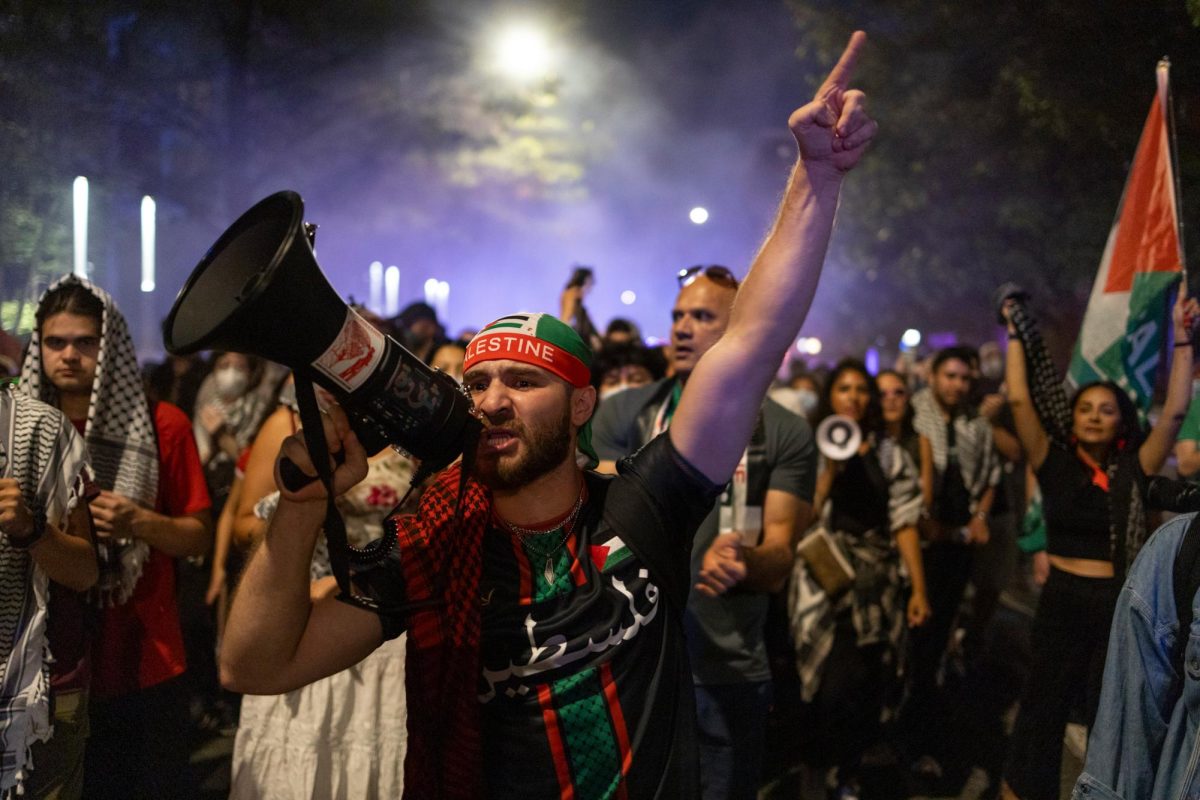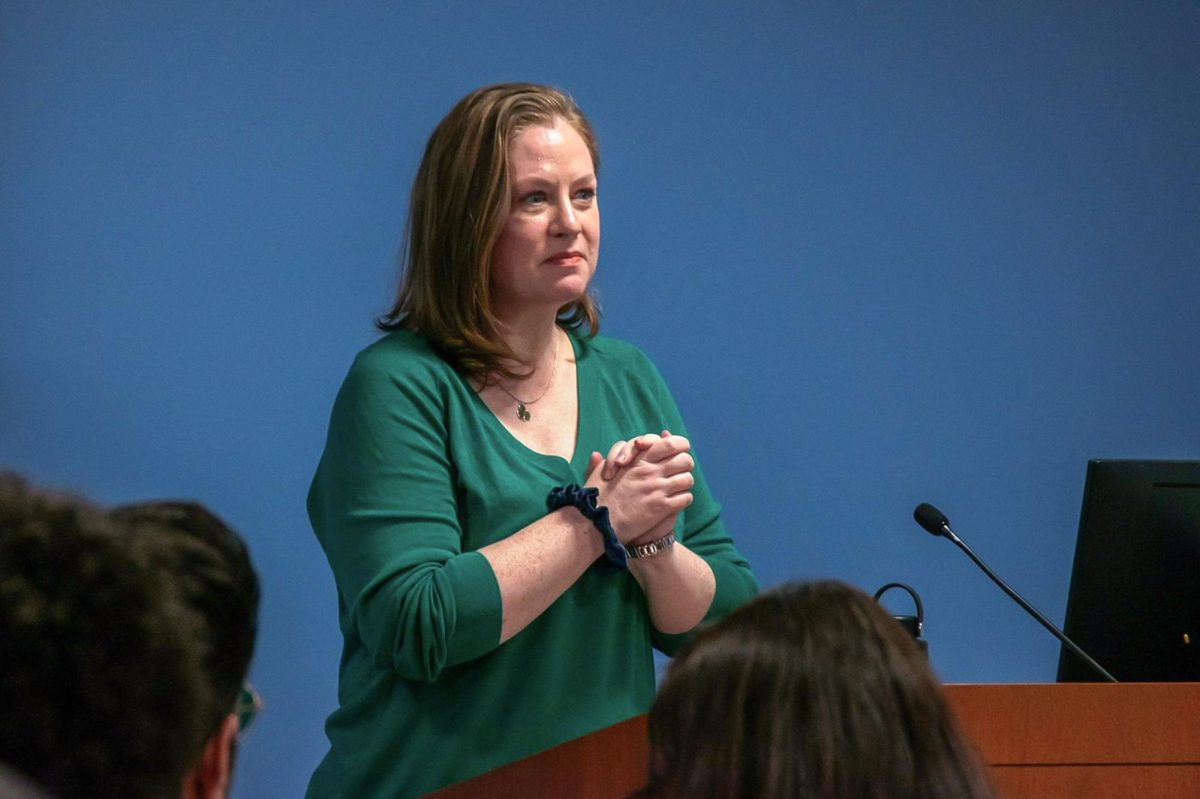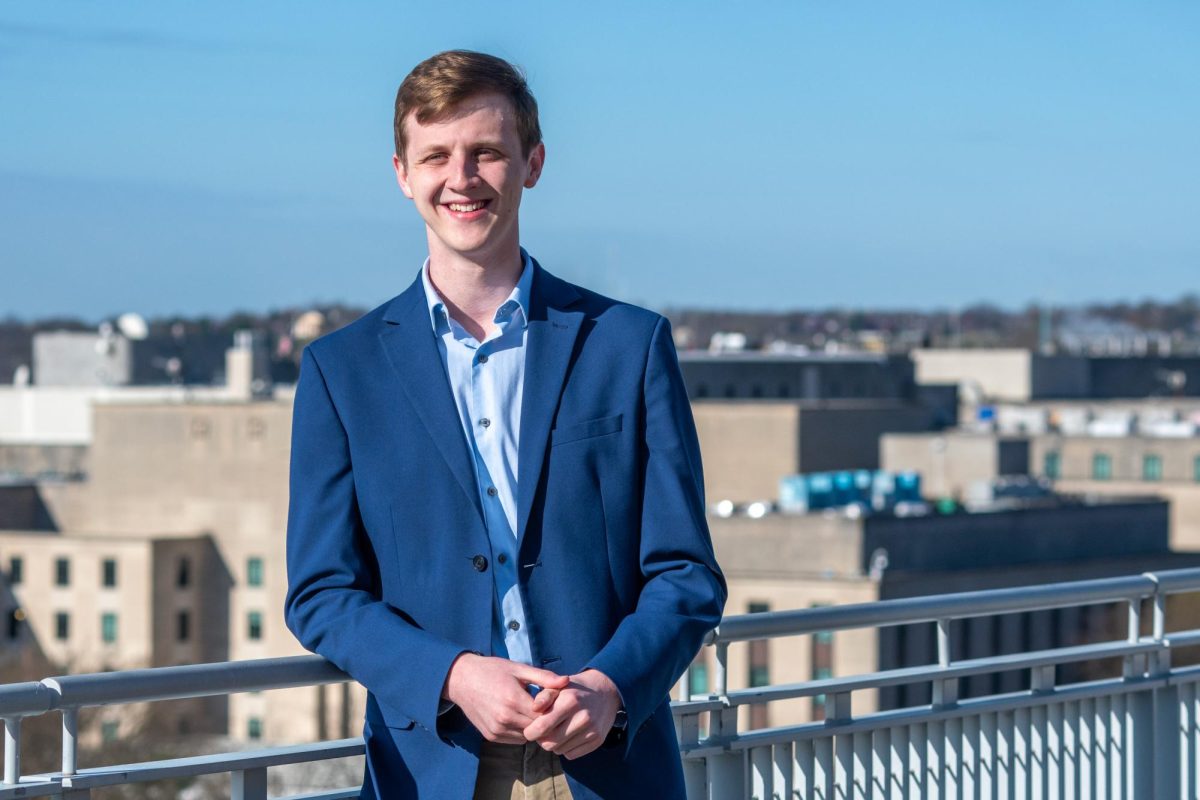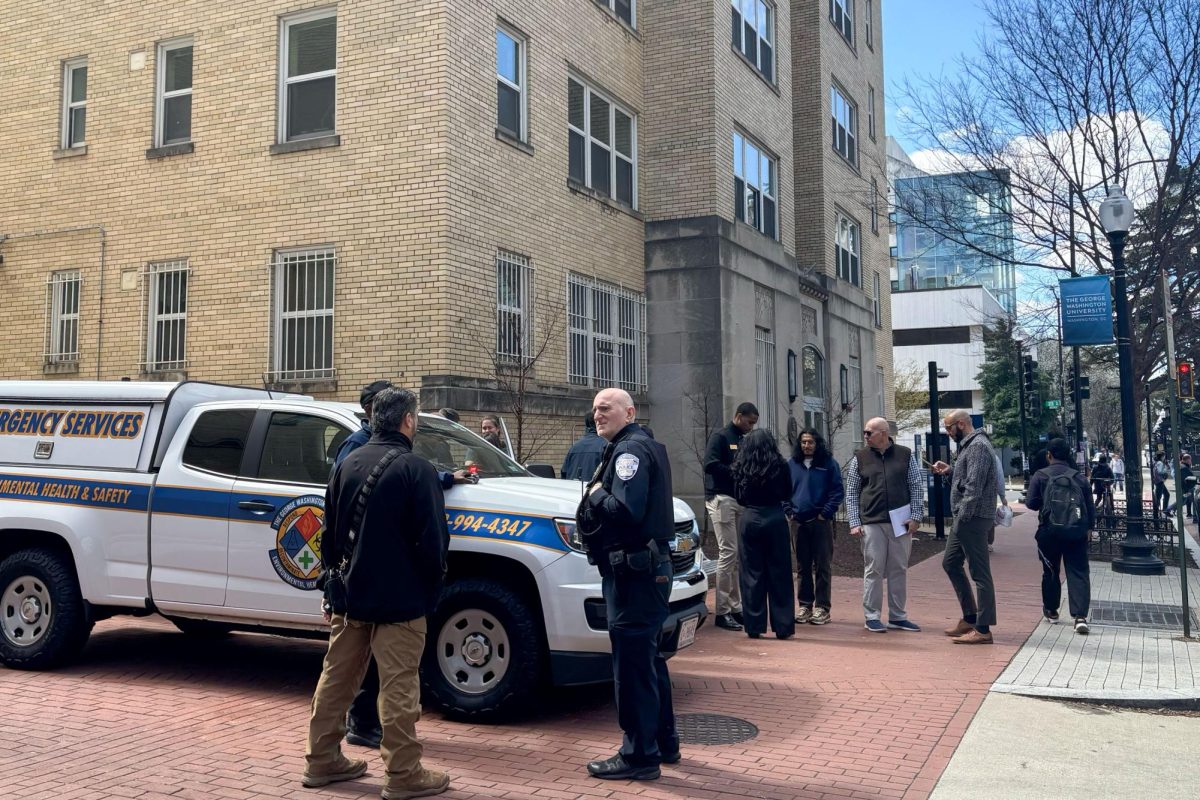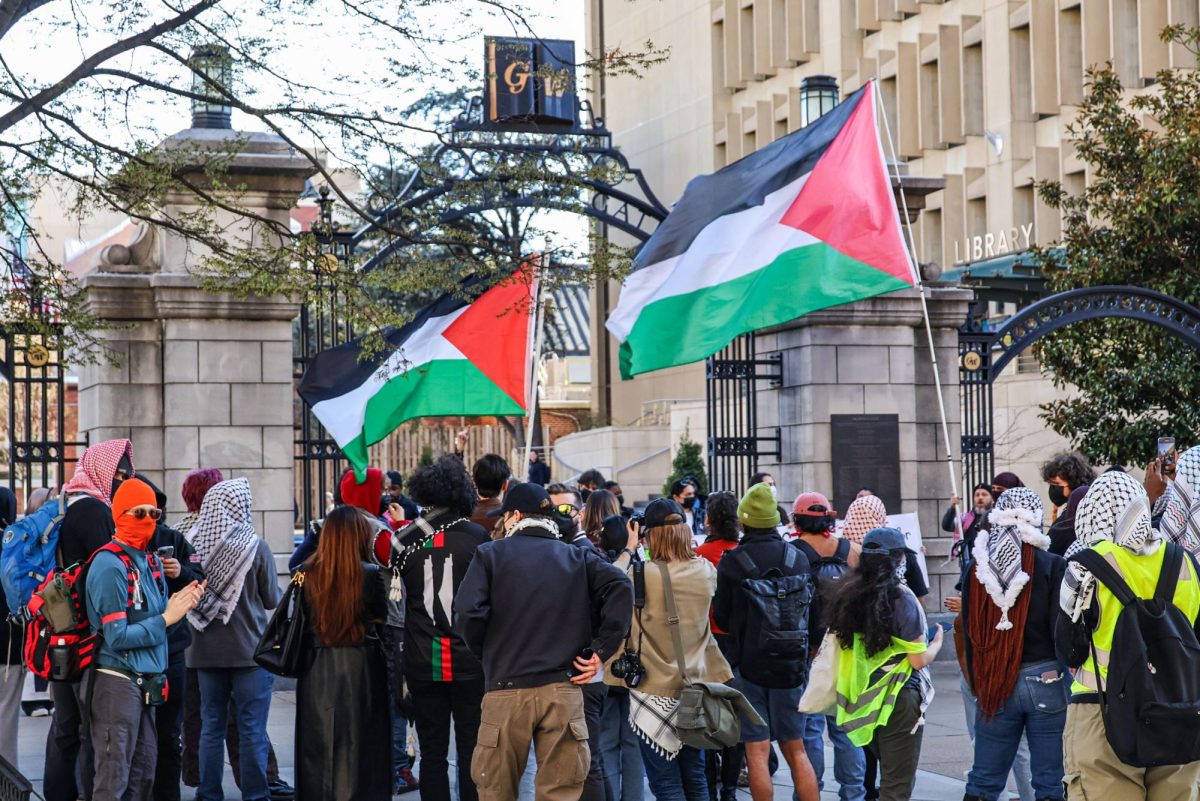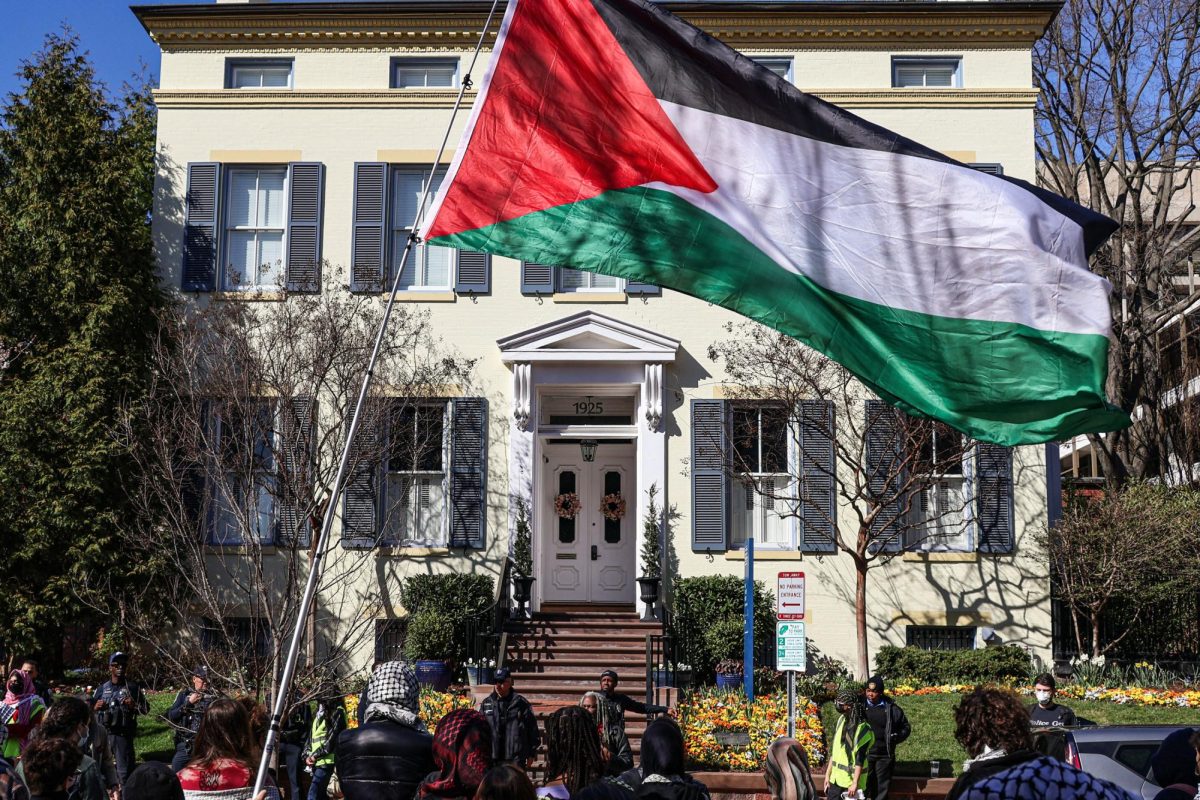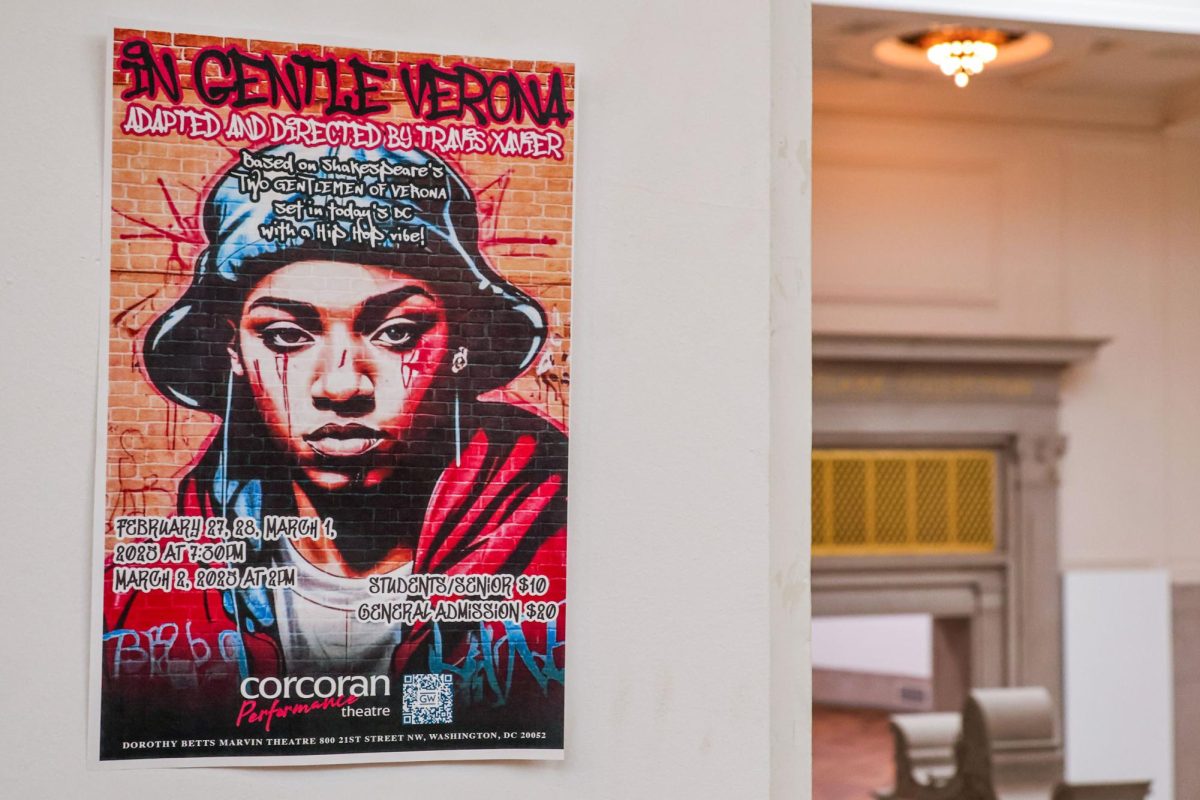Pro-Palestinian protesters rallied outside University President Ellen Granberg’s on-campus house and the barricades surrounding University Yard on the first day of the fall semester to underscore ongoing demands that GW discloses its finances and divests from Israel.
At 6 p.m. on Thursday, about 100 demonstrators gathered at James Monroe Park on the corner of 20th and I streets to hear speeches from GW pro-Palestinian student organization representatives and D.C. activist groups before marching to Granberg’s F Street House, and then to the barricades that officials installed around U-Yard following the pro-Palestinian encampment in the spring. At the beginning of the protest, University security personnel asked students in U-Yard to leave and closed the gates, which are supposed to remain open daily from 6 a.m. to 11 p.m.
One security officer guarding Kogan Plaza told Hatchet reporters not to walk through the area but officials did not erect any barriers to block off the space during the protest. Officials had previously fenced off Kogan during the encampment in the spring before removing them on July 14.
The rally and march marked the first pro-Palestinian protest of the semester promoted to the public via social media. More than a dozen protesters gathered for an unannounced demonstration at the National Mall Kickback orientation event Wednesday with signs like “GW funds genocide” and voluntarily dissipated after roughly an hour.
“During the summer and at the end of last school year, GW used the opportunity that classes were ending and people were getting off campus,” said a GW student, who chose to remain anonymous in solidarity with other Palestinian activists who have been doxxed. “And so we’re able to come in and say ‘Nope, we’re back and we’re here, nothing happened.’”
The DMV Students for Justice in Palestine Coalition — a coalition of pro-Palestinian groups at D.C. universities that organized the encampment last spring — announced the Thursday protest in an Instagram post on Tuesday. In the post, the coalition called on community members to pressure GW officials to accept the demands previously put forward by pro-Palestinian GW student organizations.
“As negotiations resume, let GW know that the people of this city demand divestment from genocide,” the post reads, referring to officials accepting conditions from the coalition to begin discussions with administrators about its demands for the University to cut academic and financial ties to Israel and protect pro-Palestinian students.
On Thursday, representatives from DMV Students for Justice in Palestine and GW Alumni for Justice in Palestine reiterated their demands at the rally in the park, including that GW divest from companies with ties to Israel, drop charges against pro-Palestinian student organizers and disclose all University endowments and investments.
Seven Metropolitan Police Department officers stood and watched the Monroe Park protest from about 20 feet away. During the rally, one organizer read a speech on behalf of the Student Coalition for Palestine, which students claimed on Monday that GW suspended through the fall semester for involvement in protests last spring.
“The GW administration knows this power,” the organizer said on behalf of the coalition. “They have seen this campaign erupt in moments of mass organization and have seen how such collective power transforms the consciousness of everyone, and that makes the administration afraid.”
A speaker from the All African People’s Revolutionary Party, a socialist pan-African political party, told demonstrators in Monroe Park that justice for Palestine will not come overnight, and that protesters must continue their resistance against the University and Israel.
“When you left, we were talking about 50 to 60,000 dead from bombs and bullets,” the speaker said. “Now we are talking about hundreds of thousands dead and dying of starvation.”
After more than an hour of rallying, protesters marched to the F Street House, chanting “Granberg Granberg we know you, you endanger students too” and “From the river to the sea, Palestine will be free.”
Three MPD cars trailed behind the crowd as demonstrators marched down 21st Street toward the F Street House, blocking off the corners of 20th and F streets. As protesters arrived to Granberg’s residence, more than 40 MPD officers lined F Street, blocking students from the house.
The crowd then screamed in unison for about a minute at Granberg’s house in an effort to verbalize the pain of Palestinians in Gaza, a tactic used by pro-Palestinian protesters at Columbia University to condemn then-university president Minouche Shafik’s handling of campus protests. About 100 protesters then screamed and banged on surrounding trash cans for about two minutes.
A representative from the DMV Students for Justice in Palestine spoke before the crowd and said during first-year orientation, a student confronted Granberg about the “brutality” students faced from MPD officers during the encampment sweep. The representative said that Granberg told the student the brutality “never happened.”
“It is clear that Ellen Granberg believes that the upperclassmen will graduate and the new students will forget,” the representative said. “But the student intifada is built on decades of anti-imperialist student organizing.”
At about 8:40 p.m., demonstrators marched from the F Street House to the fences surrounding U-Yard. Some protesters began pushing on the fencing before MPD officers stepped between demonstrators and the fencing and shoved people who were banging on fences. In response, protesters chanted “Oink oink, piggy piggy” and “MPD, KKK, IOF, they’re all the same.”
Protesters voluntarily dispersed around 9:30 p.m., reminding other demonstrators to use the buddy system to get home safely.
Another GW student, who requested anonymity due to fear of doxxing, said protesters’ anger “only increased” over the summer because the 11-month mark of the war in Gaza is approaching in September with no signs of an end to Israeli violence in Gaza. The student said many Palestinian students at GW have lost more than a dozen family members in Gaza, with some having lost more than 100 Palestinians close to them.
The student said protesters’ anger toward GW has increased because officials are continuing to “repress” pro-Palestinian student organizations, including Students for Justice in Palestine at GW and Jewish Voice for Peace at GW, who students said officials suspended for the fall semester on Aug. 6 due to their reported involvement in the spring encampment.
The coalition said in June that student groups faced charges from GW’s Conflict Education & Student Accountability office for Code of Student Conduct violations related to the pro-Palestinian encampments in U-Yard and on F Street, and for an April protest at the Elliott School of International Affairs.
“I think admin was hoping that anger would dissipate over the summer, and if anything, it’s more than ever,” the student said.
After MPD officers cleared the U-Yard encampment on May 8, representatives from student organizations involved in the coalition met with Granberg and Chief Financial Officer Bruno Fernandes. Before the meeting, officials said GW will not commit to divesting from companies selling weapons to Israel or disclosing University finances.
The coalition said in an Instagram post Wednesday that officials agreed to five conditions from students in order for GW and student protesters to resume “negotiations” about their demands.
The GW student on Thursday said the Student Coalition for Palestine at GWU is currently working on finding a time to set up the first meeting of the semester between officials and students in the next two weeks.
The student added that MPD arrested eight GW students during the encampment, contradicting previous claims from a University spokesperson and Granberg that six students faced arrest. The representative said Granberg reported the wrong number because some students’ names were “so badly misspelled” in the arrest system that officials were unable to identify them as GW students. In May, The Hatchet identified eight GW students from arrest records.
On Wednesday, officials held a first-year orientation event called “You Can’t Say That at GW…or Can You?” in which Office of Conflict Education and Student Accountability Director Christy Anthony discussed limits to free speech on campus like violent threats and protests that disrupt students’ ability to learn. She also detailed which type of protests are permitted on campus like “orderly” demonstrations.
“The reality is free speech does mean that we all might spend some time in situations that are uncomfortable,” Anthony said at the event. “But the University does not tolerate unreasonable interference, including threats of violence.”


